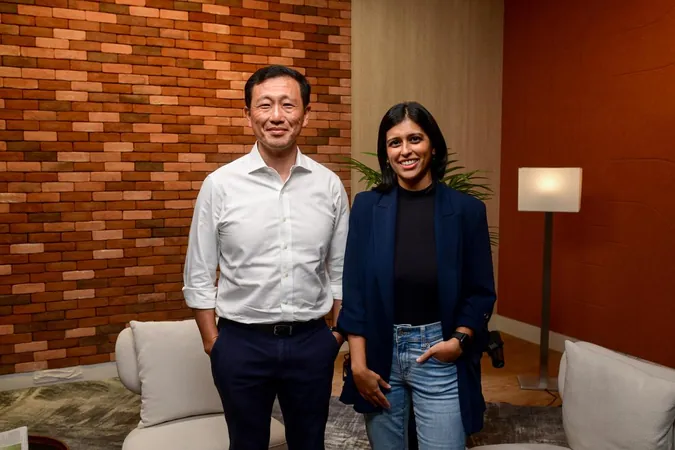
Ong Ye Kung Warns Against Political Paralysis: The Stakes for Singapore Ahead of GE2025
2025-03-25
Author: Arjun
SINGAPORE - As the nation prepares for the upcoming General Election in 2025, Health Minister Ong Ye Kung is urging Singaporeans to take the critical importance of effective governance seriously amid rising global tensions and economic uncertainty.
In remarks made on March 23, Mr. Ong was questioned regarding the increasing push for more elected opposition members in Parliament and whether this shift could disrupt the political stability in Singapore. He stressed that a strong and cohesive government is essential for navigating the complex landscape shaped by international dynamics and internal challenges.
Quoting the trust that the government placed in its citizens during the pandemic to adhere to COVID-19 protocols, Mr. Ong asserted that Singaporeans possess the judgment to make decisions that serve the country’s best interests. “You don’t want a government that is embroiled in paralysis,” he stated. “Movement is essential for progress, and Singaporeans are keenly aware of this reality.”
Reflecting on the evolving political landscape, Ong admitted that there has long been a desire for greater opposition representation in Parliament, a trend he personally experienced during the 2011 General Election when he and his team from the People’s Action Party (PAP) faced a stunning defeat in Aljunied GRC. He recalled the intense challenges of that campaign and described the feelings of helplessness he encountered.
“Sometimes, the harder you struggle, the more you sink,” he recalled, drawing a parallel to the perceived momentum for wider opposition representation. However, he emphasized that elections should ultimately cultivate an effective governing body. Ong acknowledged that citizens often envision a government led by the PAP with a robust opposition to provide checks and balances, which he agrees represents a viable model for governance.
With the current composition of Parliament featuring 12 opposition members—an increase from just two before 2011—Ong highlighted that effective governance isn’t strictly about numbers. The balance of power is shaped by a variety of factors, including the perceptions of the ruling party’s performance and responsiveness to the electorate's needs.
“Voters will evaluate the integrity and dedication of their elected representatives—not just from the ruling party but also from the opposition,” he added. “Singaporeans have a range of aspirations, and to build a unified future, we must ensure that electoral differences do not fragment our society.”
Regarding his own political future, Ong deferred to party leadership but expressed a strong desire to continue representing Sembawang GRC, where he has served for a decade. He fondly spoke about the community he has developed bonds with and highlighted his commitment to preserving the unique character of Sembawang, a district that retains its 'kampung' charm amidst modern development.
Ong also acknowledged that while newcomers to the area might miss certain urban amenities, such as large shopping centers, the authenticity and tranquil lifestyle that Sembawang offers are irreplaceable. “This is a place where natural beauty meets community spirit, and I will do my utmost to maintain that essence,” he concluded.
As the political winds shift with the approach of GE2025, Ong's insights serve as a reminder to Singaporeans of the importance of an engaged electorate ready to participate thoughtfully in the democratic process. Will Singapore opt for political agility or risk the dangers of stagnation? The answer lies ahead in the coming election, as citizens weigh their choices with increasing complexity.




 Brasil (PT)
Brasil (PT)
 Canada (EN)
Canada (EN)
 Chile (ES)
Chile (ES)
 Česko (CS)
Česko (CS)
 대한민국 (KO)
대한민국 (KO)
 España (ES)
España (ES)
 France (FR)
France (FR)
 Hong Kong (EN)
Hong Kong (EN)
 Italia (IT)
Italia (IT)
 日本 (JA)
日本 (JA)
 Magyarország (HU)
Magyarország (HU)
 Norge (NO)
Norge (NO)
 Polska (PL)
Polska (PL)
 Schweiz (DE)
Schweiz (DE)
 Singapore (EN)
Singapore (EN)
 Sverige (SV)
Sverige (SV)
 Suomi (FI)
Suomi (FI)
 Türkiye (TR)
Türkiye (TR)
 الإمارات العربية المتحدة (AR)
الإمارات العربية المتحدة (AR)